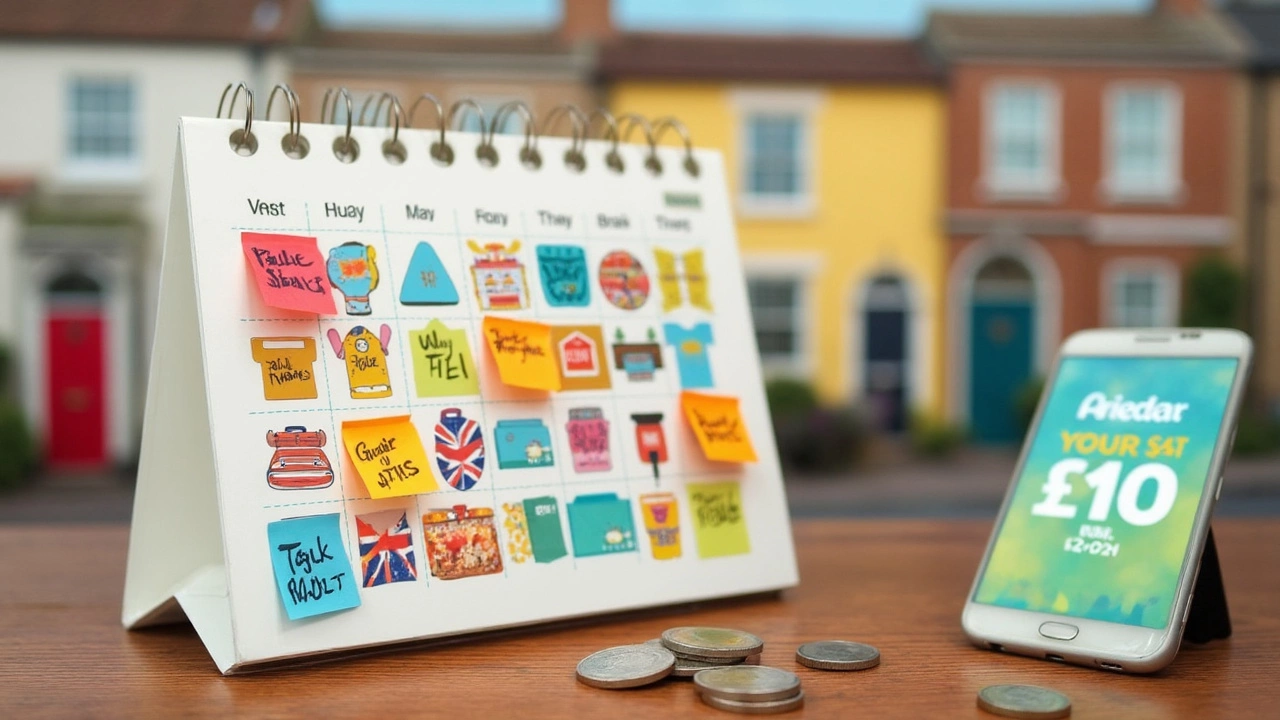Cheapest Day to Buy a Holiday: When Last Minute Deals Are Hot
 Jun, 18 2025
Jun, 18 2025
Everyone wants to know the magic day that holidays are at their cheapest. The truth is, there’s actual data behind the best times to book your escape—especially if you love rolling the dice on last minute deals.
Airline and holiday companies change prices every day, sometimes even by the hour. But here’s a little secret: midweek, especially Tuesdays and Wednesdays, tends to see the lowest prices. Why? Fewer people are browsing, so companies drop prices to tempt you in. If you’re booking at the last minute, this becomes even more important, because weekend prices go up when everyone’s looking to get away.
But before you start refreshing all those holiday sites on a Tuesday, don’t forget that prices can still change in a flash. Stay flexible and keep your eyes peeled for flash sales, especially late at night or early morning. These hidden windows can mean serious savings, especially if you’re not picky about exact dates or destinations.
- Why Holiday Prices Fluctuate
- Best Days of the Week to Find Deals
- Surprising Booking Myths
- Last Minute Advantage: How to Spot Real Bargains
- Smart Tricks for Extra Savings
Why Holiday Prices Fluctuate
Ever noticed how holiday prices can change from one day to the next, even for the same trip? You’re not imagining it. There’s a bunch of reasons holidays don’t stay the same price for long, and knowing why can help you catch the cheapest deals.
First off, demand plays a huge role. Flights and hotels use dynamic pricing—basically, the higher the demand, the higher the price. This is why holidays jump in price during school breaks, summer, or big events. But even on random weekdays, if more people are searching for a destination, prices can creep up without warning.
Another thing at play: algorithms. Travel sites and airlines use super-quick computer systems to scan for booking patterns, trending locations, and even what you’ve searched before. They adjust prices in real time, sometimes hundreds of times a day, just to maximize their profits.
Here’s a quick look at some factors that set off price changes:
- Time until departure (Closer dates usually mean higher prices—unless it’s a last minute holidays deal the company is desperate to sell.)
- Day of the week (Weekends are more expensive because that’s when most people search and book.)
- School holidays and local festivals (Jumps in demand pump up the price fast.)
- Currency exchange rates (If the pound drops, you might pay more abroad in seconds.)
- Even the weather (Storm coming? Watch prices for affected destinations drop.)
Check out this handy table showing just how much average holiday prices can vary by month in the UK, based on a 7-night package holiday:
| Month | Average Price (£) |
|---|---|
| January | 410 |
| April | 560 |
| August | 1,080 |
| November | 390 |
One last tip: clearing your cookies or searching in private mode can sometimes reveal lower prices. No guarantees, but it’s worth a shot. When it comes to nabbing the cheapest day for your trip, understanding these price swings gives you the upper hand.
Best Days of the Week to Find Deals
If you want to lock in a bargain, the day you click "book" matters more than you think. Over the last few years, travel industry data has revealed a clear trend: prices for holidays and flights are usually lowest on Tuesdays and Wednesdays. Why? Most people shop for trips during the weekend when they're off work, pushing prices up thanks to higher demand. When things quiet down midweek, holiday companies quietly drop those prices hoping to fill unsold spaces.
Let’s break it down. According to data from Skyscanner and Expedia, searches and bookings tend to dip on Tuesdays, so this is when travel agencies are more likely to roll out secret flash deals. Wednesdays follow closely behind for the same reason. Some travel insiders even say booking between midnight and 6 a.m. local time can give you an edge. These less busy hours can mean major price drops as companies reset their deals overnight.
Here's a simple cheat-sheet to remember when searching for the cheapest day to book:
- Tuesdays: Most reliable for flight and package holiday deals. Compare prices in the morning and then again late at night.
- Wednesdays: Fewer people are booking, so travel sites often push discounts to grab your attention.
- Fridays and weekends: Not ideal. Prices usually creep up as everyone starts dreaming about escaping work.
Don’t forget: if you’re hunting for last minute holidays, keep checking throughout the day, but prioritize early and midweek for real savings. Set up alerts on your favorite booking sites. Sometimes companies slash prices with zero warning—especially if they need to fill empty seats or hotel rooms fast.

Surprising Booking Myths
Think booking at midnight gives you the cheapest prices? Or maybe you’ve heard that the earlier you book, the better the price? Let’s break down some common myths and see what really works when hunting for cheapest day rates and last minute holidays.
- Myth 1: Sundays are the best days to book. People often believe that weekends offer bargains, but real data shows prices peak when everyone is off work, clicking around for deals. Most sites actually raise their prices Friday to Sunday, knowing demand is higher.
- Myth 2: Last minute ALWAYS means cheaper. While grabbing a last minute trip can save money, it’s not a golden rule. Sometimes, prices actually rise as you get closer to departure, especially for popular spots or during school holidays. Best trick? Be flexible with where and when you go.
- Myth 3: Incognito mode means you’ll outsmart the system. The rumor is that travel sites hike prices when they know you’re interested, but there’s little proof this makes a dent. Airlines and package providers use complex algorithms based on overall demand, not just your search history.
- Myth 4: Wait for the official “sale day.” Black Friday, Cyber Monday, or random flash sales can have headline deals, but hidden bargains pop up other times too—often midweek or super late at night when fewer people are online.
Here’s the deal: don’t lock yourself into one booking “rule.” Stay open to switching dates, times, and even airports, and you’ll spot more deals than just waiting for those so-called magic days. The only universal tip? Check often and act fast when you spot that perfect price.
Last Minute Advantage: How to Spot Real Bargains
Going for a holiday at the last minute can feel risky, but it’s hands-down the best way to catch a real bargain. Travel companies don’t want empty planes or unsold hotel rooms, so they slash prices to fill those last spots. The trick is knowing how to spot these deals before someone else beats you to it.
First up, check package holiday websites and apps after midday on Tuesdays and Wednesdays. That’s when travel companies tend to update unsold inventory and roll out extra discounts. If you’re flexible about where you go and can leave at short notice, you’ll have the pick of the best discounts. Some online forums even have deal hunters who report crazy-cheap prices late on Tuesday evenings—it’s a good idea to follow a few of these to get instant alerts.
It’s also worth clearing your browser cookies or using incognito mode. This stops sites from tracking your searches, which can sometimes push prices up if they spot you coming back for the same deal.
When it comes to flights, consider alternative airports near your original destination, since last minute cheapest day fares often pop up from places that aren’t the main hub. Remember that charter flights and lesser-known airlines offer last minute specials the big brands skip over. And always double-check that the discount is genuine—compare the price with a standard booking for another date and see just how much you’re really saving.
- Set up price alerts on booking sites so you’re first to know when a deal drops.
- Be flexible—let the deals guide your holiday choice, not the other way around.
- Jump on flash sales, which usually appear Thursdays and Fridays when tour operators hit panic mode.
Above all, act fast! Last minute deals rarely last long, so if you see a price that sounds too good to be true, it probably won’t be there tomorrow. Snag it before it’s gone.

Smart Tricks for Extra Savings
If you’re serious about squeezing more value out of your next holiday, it’s not just about picking the right day. Combining a few smart moves can take your deal hunting to the next level. Here’s what actually works—according to recent booking data and experienced travellers.
- Clear your browser history: Sites can hike prices if they know you’ve been browsing for the same trip over and over. Booking in incognito mode or clearing cookies resets the pricing for you, so you’re not paying more just because you looked before.
- Set up price alerts on multiple sites. Tools like Skyscanner, Kayak, and Google Flights watch rates for you and ping you when prices drop. For last minute holiday savings, you want to jump as soon as the alert lands.
- Use cashback sites or loyalty programs. Cashback sites like TopCashback or Rakuten can shave off an extra few percent. Plus, if you’re a loyalty member with an airline or hotel, stack your discounts for even lower prices.
- Bundle your flight and hotel. Package deals often work out cheaper than booking each part separately, because travel agents get bulk rates. This is especially true for last minute trips when airlines and hotels want to fill empty spots fast.
- Don’t overlook alternative airports or dates. Flying a day earlier or later, or picking a smaller airport nearby can seriously cut costs. Flexible travelers get the best deals.
To see how much you can actually save using these tricks, take a look at the numbers below from a 2024 study of last minute bookings in the UK:
| Savings Method | Average Discount (%) |
|---|---|
| Booking Tuesday vs. Friday | 15% |
| Bundling Flight & Hotel | 20% |
| Using Cashback Site | 5% |
| Flexible on Dates | Up to 25% |
Stacking these hacks can mean real, hard cash in your pocket—and it only takes a few extra minutes. Why pay more when you don’t have to?
